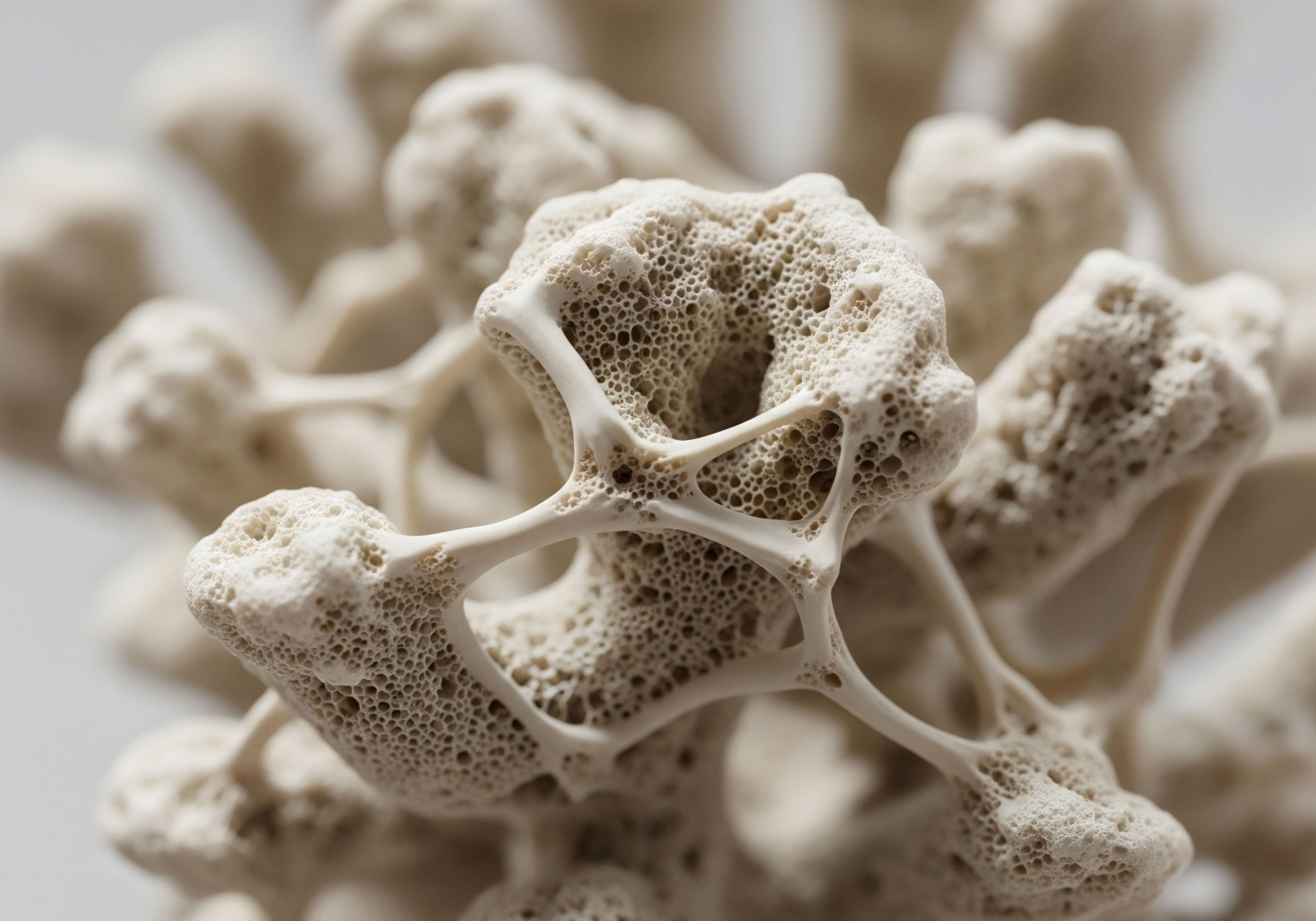

Fundamentals
The sensation of mental fog, a lapse in memory, or a frustrating inability to focus while undergoing anti-androgen therapy is a deeply personal and valid experience. Your perception of this cognitive shift is a direct reflection of a profound biological change occurring within your body.
This experience begins with understanding the role of androgens, such as testosterone, as far more than just male hormones. They are fundamental signaling molecules that orchestrate a vast array of physiological processes, including the very architecture and function of your brain. These hormones act as conductors for your cognitive orchestra, ensuring mental clarity, sharpening memory recall, and maintaining the speed at which you process the world around you.
Androgen receptors, the docking stations for these hormonal messengers, are densely populated in critical brain regions like the hippocampus and prefrontal cortex, the command centers for learning, memory, and executive function. When you begin a protocol like Androgen Deprivation Therapy (ADT) for a condition such as prostate cancer, the primary medical goal is to lower androgen levels to manage the disease.
This therapeutic action intentionally quiets the signals from these powerful conductors. The resulting cognitive symptoms are a direct consequence of this reduction in signaling. The brain regions accustomed to a certain level of androgenic stimulation must now adapt to a new, quieter internal environment. This adaptation period is where the feelings of cognitive disruption often arise.
Understanding your body’s hormonal systems is the first step toward reclaiming cognitive vitality during treatment.
The central question then becomes one of support and resilience. With the primary hormonal conductor operating at a lower volume, how can we bolster the entire physiological system to help the brain perform optimally? This is where lifestyle interventions become a powerful and proactive strategy.
These interventions are a way to fortify the underlying health of the body and brain, providing alternative pathways to support the functions that androgens once heavily influenced. It is about building a robust biological foundation that can withstand the therapeutic hormonal shifts. By focusing on systemic health through targeted lifestyle choices, you are actively participating in the management of your cognitive well-being, transforming a passive experience into a journey of empowered self-stewardship.

The Brains Chemical Messengers
To appreciate the connection between hormonal therapy and cognition, one must first recognize the brain’s dependence on chemical messengers. Androgens are key players in this intricate communication network. They contribute to the process of synaptic plasticity, which is the ability of synapses, the connections between neurons, to strengthen or weaken over time.
This plasticity is the cellular basis of learning and memory. Testosterone, for instance, has been shown to support the growth and maintenance of neurons and their connections. When levels of these hormones are therapeutically reduced, the dynamic nature of these connections can be affected, leading to difficulties in forming new memories or accessing old ones. The experience of “brain fog” is, in a very real sense, the subjective feeling of this altered synaptic landscape.

A System Wide Perspective
The effects of anti-androgen therapy extend beyond the brain. These hormones play a role in regulating metabolism, mood, and energy levels, all of which are interconnected with cognitive function. For instance, ADT can increase the risk of metabolic changes, such as weight gain and insulin resistance, which themselves are linked to cognitive impairment.
This highlights the importance of a holistic approach. A lifestyle intervention that supports metabolic health, for example, will have cascading benefits that also support brain function. This systems-based view allows for a more comprehensive strategy, one that addresses the root physiological changes induced by the therapy, rather than just the symptoms. It is a recognition that the brain does not operate in isolation; its health is inextricably linked to the health of the entire body.


Intermediate
Moving from the acknowledgment of cognitive changes to a plan of action requires a detailed understanding of how specific lifestyle interventions directly counteract the biological effects of androgen suppression. These are not generic wellness tips; they are targeted strategies designed to fortify the very neural and metabolic pathways that are challenged by anti-androgen therapy.
The approach is built on distinct pillars, each addressing a different aspect of the physiological disruption, and together they form a comprehensive protocol for building cognitive resilience. The goal is to create an internal environment that is robust, anti-inflammatory, and rich in the resources the brain needs to adapt and function effectively.

The Pillars of Cognitive Fortification
Four key areas of lifestyle modification form the foundation of a protocol aimed at preserving cognitive function. These pillars are strategic physical exercise, precision nutritional support, restorative sleep, and cognitive engagement. Each one provides a unique set of biological signals that can compensate for the reduction in androgenic signaling, helping to maintain brain structure and function. Adopting a structured approach that incorporates all four pillars creates a powerful, synergistic effect that supports overall health and cognitive vitality.

Strategic Physical Exercise
Physical activity is a potent modulator of brain health, acting through multiple, well-defined mechanisms. Regular exercise has been shown in numerous studies to improve cognitive function in men undergoing ADT. The benefits are dose-dependent and specific to the type of activity performed.
- Aerobic Exercise ∞ Activities like brisk walking, running, or cycling increase cerebral blood flow, delivering more oxygen and nutrients to brain tissue. This type of exercise is also a powerful stimulus for the production of Brain-Derived Neurotrophic Factor (BDNF), a protein that acts like a fertilizer for neurons, promoting their growth, survival, and the formation of new connections. Increased BDNF levels can directly counter the potential reduction in synaptic plasticity associated with low androgen levels.
- Resistance Training ∞ Lifting weights or using resistance bands does more than build muscle. It improves the body’s sensitivity to insulin, a critical factor given that ADT can promote insulin resistance. Improved insulin signaling is vital for brain health, as the brain is a major consumer of glucose. Maintaining lean muscle mass also supports a healthier inflammatory profile and provides a reservoir of amino acids that are important for neurotransmitter synthesis.
A balanced exercise regimen incorporates both aerobic and resistance training. This combination provides the dual benefits of enhanced neurochemical support and improved metabolic health, creating a robust defense against cognitive decline.
| Exercise Type | Primary Mechanism | Cognitive Benefit |
|---|---|---|
| Aerobic (e.g. Running, Swimming) | Increases BDNF, improves cerebral blood flow, reduces inflammation. | Supports memory formation, enhances executive function, improves processing speed. |
| Resistance (e.g. Weightlifting) | Improves insulin sensitivity, maintains muscle mass, releases myokines. | Protects against metabolic-related cognitive decline, supports mood, improves executive function. |

Precision Nutritional Support
The food you consume provides the raw materials for every cellular process in your body, including those that govern brain function. A diet designed to support cognition during anti-androgen therapy focuses on reducing inflammation, providing essential brain-building nutrients, and supporting a healthy gut microbiome.
An anti-inflammatory eating pattern, such as the Mediterranean diet, rich in fruits, vegetables, fatty fish, and olive oil, has been associated with better cognitive outcomes. Specific nutrients are of particular importance:
- Omega-3 Fatty Acids ∞ Found in fatty fish like salmon and sardines, these fats are integral components of neuronal membranes. They enhance membrane fluidity, support cell signaling, and are precursors to powerful anti-inflammatory molecules. DHA, a specific type of omega-3, is the most abundant fatty acid in the brain.
- Polyphenols ∞ These compounds, found in colorful plants like berries, dark chocolate, and green tea, are potent antioxidants. They help protect the brain from oxidative stress, a form of cellular damage that can be exacerbated by the metabolic changes associated with ADT.
- B Vitamins ∞ Vitamins B6, B12, and folate are crucial for energy metabolism and for the synthesis of neurotransmitters. They also play a key role in managing levels of homocysteine, an amino acid that, when elevated, is a risk factor for cognitive decline.
Targeted nutrition provides the essential building blocks the brain needs to maintain its structure and function.

Restorative Sleep and Circadian Rhythms
Sleep is a critical period for brain maintenance. During deep sleep, the brain clears out metabolic waste products, including amyloid-beta, the protein implicated in Alzheimer’s disease. Anti-androgen therapy can disrupt sleep patterns, often causing hot flashes and insomnia, which can impair these vital clearance processes and worsen cognitive function.
Prioritizing sleep hygiene is therefore a non-negotiable component of any cognitive support plan. This includes maintaining a consistent sleep schedule, creating a cool, dark, and quiet sleep environment, and avoiding stimulants like caffeine in the afternoon and evening. These practices help to regulate the body’s internal clock, or circadian rhythm, which governs the release of hormones like cortisol and melatonin, both of which have profound effects on brain function and sleep quality.


Academic
A sophisticated analysis of reversing anti-androgen-induced cognitive changes requires an examination of the intricate molecular and cellular mechanisms at play. The cognitive deficits experienced are the macroscopic manifestation of microscopic disruptions in neurobiology, neuroinflammation, and metabolic signaling. Lifestyle interventions, from this academic perspective, are targeted biological response modifiers. They initiate specific signaling cascades that can directly compensate for the absence of androgenic signaling, mitigate downstream pathological processes, and promote the brain’s innate capacity for repair and adaptation.

The Neurobiology of Androgen Deprivation
Androgens exert profound organizational and activational effects on the central nervous system. Testosterone and its more potent metabolite, dihydrotestosterone (DHT), bind to androgen receptors (ARs) that are widely expressed in neurons and glia within key cognitive circuits, particularly the hippocampus and cerebral cortex.
The binding of an androgen to its receptor initiates a cascade of genomic events, regulating the transcription of genes involved in neuronal survival, differentiation, and plasticity. One of the most critical processes influenced by androgens is synaptic plasticity, particularly long-term potentiation (LTP), the molecular mechanism underlying memory consolidation. Studies have shown that androgens can enhance the density of dendritic spines, the primary sites of excitatory synapses, thereby increasing the brain’s capacity for information processing.
Furthermore, the neurobiological effects of testosterone are also mediated through its aromatization to estradiol by the enzyme aromatase, which is present in the brain. This locally synthesized estradiol then acts on estrogen receptors, which also play a significant role in neuroprotection and synaptic plasticity.
Anti-androgen therapies, by drastically reducing circulating testosterone, effectively shut down both the direct AR-mediated pathways and the indirect estrogen receptor-mediated pathways, creating a dual deficit in neurotrophic support. This leads to a reduction in synaptic resilience and a diminished capacity for neurogenesis, providing a clear biological basis for the observed declines in verbal memory and executive function.

How Does Androgen Deprivation Promote Neuroinflammation?
The suppression of androgens alters the brain’s immune landscape, shifting it towards a pro-inflammatory state. The brain’s resident immune cells, microglia and astrocytes, express androgen receptors and are responsive to hormonal cues. In a state of androgen sufficiency, testosterone can exert anti-inflammatory effects.
Its absence, as seen in ADT, appears to unleash a pro-inflammatory cascade. Microglia can transition from a homeostatic, surveillance phenotype to an activated, pro-inflammatory state. This transition is characterized by the upregulation and release of inflammatory cytokines such as Tumor Necrosis Factor-alpha (TNF-α) and Interleukin-6 (IL-6).
These cytokines can directly impair neuronal function. TNF-α, for example, can alter synaptic scaling and has been shown to be detrimental to LTP at high concentrations. This state of chronic, low-grade neuroinflammation creates a hostile environment for neurons, contributing to synaptic dysfunction and accelerating neurodegenerative processes.
It is a critical link between the endocrine disruption of ADT and the subsequent cognitive symptoms. Lifestyle interventions, particularly exercise and specific dietary components like omega-3 fatty acids, are known to have potent anti-inflammatory effects, in part by modulating microglial activation and reducing the production of these very cytokines.
Chronic neuroinflammation, driven by hormonal shifts, creates a challenging environment for optimal neuronal function.

The Metabolic Cascade and Brain Energetics
Androgen Deprivation Therapy is strongly associated with an increased incidence of metabolic syndrome, characterized by central obesity, dyslipidemia, hypertension, and insulin resistance. This systemic metabolic dysfunction has profound implications for brain health. The brain is an organ with extremely high metabolic demands, relying almost exclusively on glucose for its energy.
Insulin receptors are widespread in the brain, and proper insulin signaling is crucial for neuronal survival, synaptic plasticity, and neurotransmitter regulation. When the body becomes insulin resistant, the brain’s ability to utilize glucose is impaired, leading to a state of cerebral energy deficit.
This brain-specific insulin resistance not only starves neurons of fuel but also impairs the clearance of amyloid-beta (Aβ) peptides, a key pathological hallmark of Alzheimer’s disease. The link is so strong that Alzheimer’s is sometimes referred to as “Type 3 diabetes.” The increased Aβ accumulation seen in some patients on ADT may be a direct consequence of this induced metabolic dysfunction.
This provides a powerful rationale for interventions like resistance training and low-glycemic diets, which are specifically designed to improve systemic insulin sensitivity. By restoring metabolic health, these interventions can directly improve brain energetics and mitigate the accumulation of neurotoxic proteins.
| Pathological Effect of ADT | Molecular Target | Counteracting Lifestyle Intervention | Mechanism of Intervention |
|---|---|---|---|
| Reduced Synaptic Plasticity | Decreased BDNF, reduced dendritic spine density | Aerobic Exercise | Upregulates BDNF expression, promotes neurogenesis |
| Neuroinflammation | Increased TNF-α, IL-6 from activated microglia | Omega-3 Fatty Acids | Serve as precursors for anti-inflammatory resolvins and protectins |
| Impaired Brain Energetics | Brain insulin resistance, poor glucose uptake | Resistance Training, Low-Glycemic Diet | Improves systemic and central insulin sensitivity |
| Oxidative Stress | Increased reactive oxygen species (ROS) | Diet rich in Polyphenols | Provide antioxidant capacity, activate Nrf2 pathway |

References
- Zare, H. et al. “Androgen Deprivation Therapy for Prostate Cancer ∞ Focus on Cognitive Function and Mood.” Biomedicines, vol. 10, no. 7, 2022, p. 1589.
- Gonzalez, B. D. et al. “Cognitive Effect of Androgen Deprivation Therapy in Patients with Prostate Cancer.” JAMA Oncology, vol. 8, no. 3, 2022, pp. 446-447.
- Winters, S. J. et al. “Androgen Effects on Neural Plasticity.” Seminars in Reproductive Medicine, vol. 28, no. 4, 2010, pp. 303-311.
- Lu, C. et al. “Cognitive decline in prostate cancer patients undergoing ADT ∞ a potential role for exercise training in prevention and management.” Endocrine, vol. 59, no. 3, 2018, pp. 483-492.
- Sawada, K. et al. “Long-term systemic androgen deprivation partially modulates neuroinflammation in male AppNL−G−F/NL−G−F mice.” Scientific Reports, vol. 15, 2025, Article 98825.
- Pan, W. and A. J. Kastin. “Effects of Androgens on the Amyloid-β Protein in Alzheimer’s Disease.” Endocrinology, vol. 159, no. 10, 2018, pp. 3673 ∞ 3685.
- Gouras, G. K. et al. “Androgens and Alzheimer’s disease.” Current Alzheimer Research, vol. 4, no. 2, 2007, pp. 151-154.
- Hamilton, K. et al. “Sexuality and exercise in men undergoing androgen deprivation therapy for prostate cancer.” Journal of Sex & Marital Therapy, vol. 41, no. 4, 2015, pp. 425-437.
- Leranth, C. et al. “Role of Androgens and the Androgen Receptor in Remodeling of Spine Synapses in Limbic Brain Areas.” Neuroendocrinology, vol. 80, no. 3, 2004, pp. 141-149.

Reflection
The information presented here offers a map of the biological territory you are navigating. It translates the subjective feelings of cognitive change into a clear, evidence-based understanding of the underlying mechanisms. This knowledge is a foundational tool. It shifts the perspective from one of passive endurance to one of active, informed participation in your own well-being. The journey through anti-androgen therapy is unique to each individual, and the path toward cognitive resilience will be equally personal.
Consider where these strategies intersect with your own life. Reflect on which pillars of intervention feel most accessible to you right now. The power of this knowledge is realized when it is applied, thoughtfully and consistently, in partnership with your clinical team. This is the starting point for a deeper conversation about your health, one that places your experience at the center and uses science as the guide to build a personalized protocol for vitality and function.



